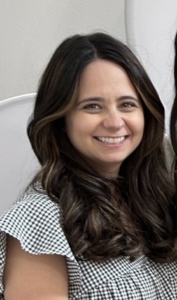For Taylor Goss, DNP, CRNA, a recent day at the beach turned into an experience she’ll never forget—and restored her faith in humanity. Working with other medical professionals, her skills as a Certified Registered Nurse Anesthetist (CRNA) contributed to saving a teenage girl’s life.

Goss, who graduated in May 2023 from LSU Health in New Orleans with her Doctorate of Nursing Practice degree, was in Seacrest Beach, Florida, for her sister’s bachelorette trip. She, her mother, and aunt had just gotten out of the water and returned to their beach chairs when they heard screaming.
“At first, I thought somebody had drowned because the waves were a little rough that day,” she said. “I stood up to see what was going on. There was a cloud of blood in the water, and a man carrying a girl onto the beach.”
The 15-year-old girl, whose name was Lulu, had been attacked by a shark. The man was a stranger who went into the water to get the shark away from Lulu and pull her to safety. “I truly believe he’s the reason she’s still alive today. I don’t know many people who would go into shark-infested waters to save a stranger,” Goss said.
Once Lulu was out of the water, everyone on the beach jumped into action. Goss’s first instinct was to call 911, but her aunt urged Goss to go help. Her aunt dialed 911, and with EMS on the way, a crowd gathered around Lulu. One of the men was a physician who instructed everyone to back away unless they were medical personnel. Goss identified herself as a CRNA and said she could assist with the patient’s airway. Another physician, an EMT, and two nurses also stepped in to help.
“I saw trauma patients during school when I did a rotation at a trauma center, and I currently work at a trauma center. But when I walked up to Lulu, it really took me aback. It took me a second to get into the right headspace,” Goss said. “When I first saw her injuries, I felt like I was going to pass out, but I took a deep breath, and something just switched in me. I went into work mode.”
Goss described Lulu’s injuries as “horrific.” All present medical personnel rushed to apply tourniquets to Lulu’s wounds. Goss said she turned to the man next to her, who was wearing a long-sleeve rash guard shirt, and said she needed it.
“One of the nurses used it as a tourniquet on Lulu’s left arm. We also needed a belt for a towel wrapped around her leg, and everyone in the crowd started giving us things they thought would work. Eventually, we got a strap from a cooler, which worked well.”
Once the bleeding was controlled, they monitored Lulu to ensure she didn’t lose her pulse until EMS arrived. Meanwhile, Lulu’s twin sister comforted and encouraged her, as well as their mother, who hadn’t been on the beach when the attack occurred.
EMS arrived 10 minutes later, placed Lulu on a stretcher, and had her airlifted to a hospital.
“Luckily, she never lost her airway, so I’m very thankful I didn’t have to use those skills in this scenario,” Goss said. “In school, we did multidisciplinary training where we did mock scenarios with other specialties, including the medical school. I relied on my training and experience to communicate effectively, work as a team, and be there emotionally for the victim and the family, too.”
Goss said she’s been reading updates about Lulu’s condition on Facebook, which the girl’s family has been providing daily. Lulu’s amputations are complete, and she’s been transferred to a specialty hospital for multiple amputee patients, where she’s receiving groundbreaking prosthetics.
“From all the updates, it doesn’t seem like this has dampened her spirits any,” Goss said. “This is going to change her life dramatically, so for her to still have such a good spirit, you could tell that she and her sister are very strong girls and they come from a really good family.”
She added, “When Lulu was extubated, they said her first words were ‘I made it.’”